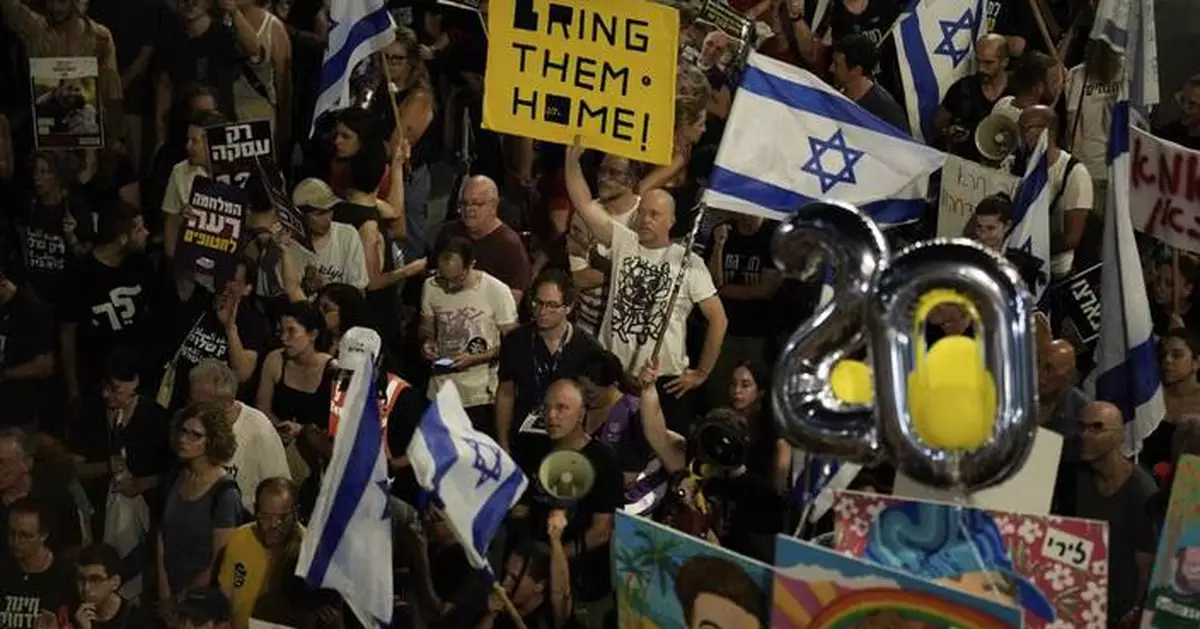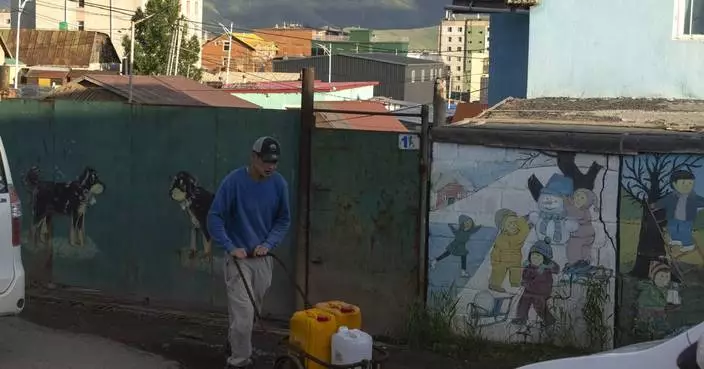TEL AVIV, Israel (AP) — The viability of a U.S.-backed proposal to wind down the 8-month-long war in Gaza has been cast into doubt after Israeli Prime Minister Benjamin Netanyahu said he would only be willing to agree to a “partial” cease-fire deal that would not end the war, comments that sparked an uproar from families of hostages held by Hamas.
In an interview broadcast late Sunday on Israeli Channel 14, a conservative, pro-Netanyahu station, the Israeli leader said he was “prepared to make a partial deal — this is no secret — that will return to us some of the people,” referring to the roughly 120 hostages still held in the Gaza Strip. “But we are committed to continuing the war after a pause, in order to complete the goal of eliminating Hamas. I’m not willing to give up on that.”
Click to Gallery
TEL AVIV, Israel (AP) — The viability of a U.S.-backed proposal to wind down the 8-month-long war in Gaza has been cast into doubt after Israeli Prime Minister Benjamin Netanyahu said he would only be willing to agree to a “partial” cease-fire deal that would not end the war, comments that sparked an uproar from families of hostages held by Hamas.
Palestinians carry the body of a man killed in the Israeli bombardment of the Gaza Strip to a hospital morgue in Khan Younis, southern Gaza Strip, Monday, June 24, 2024. (AP Photo/Jehad Alshrafi)
Palestinians mourn their relatives killed in the Israeli bombardment of the Gaza Strip at a hospital morgue in Khan Younis, southern Gaza Strip, Monday, June 24, 2024. (AP Photo/Jehad Alshrafi)
People protest against Israeli Prime Minister Benjamin Netanyahu's government and call for the release of hostages held in the Gaza Strip by the Hamas militant group, in Tel Aviv, Israel, Saturday, June 22, 2024. (AP Photo/Leo Correa)
People protest against Israeli Prime Minister Benjamin Netanyahu's government and call for the release of hostages held in the Gaza Strip by the Hamas militant group, in Tel Aviv, Israel, Saturday, June 22, 2024. (AP Photo/Leo Correa)
People protest against Israeli Prime Minister Benjamin Netanyahu's government and call for the release of hostages held in the Gaza Strip by the Hamas militant group, in Tel Aviv, Israel, Saturday, June 22, 2024. (AP Photo/Leo Correa)
People attend a protest against Israeli Prime Minister Benjamin Netanyahu's government and demanding elections, in Tel Aviv, Israel, Saturday, June 22, 2024. (AP Photo/Leo Correa)
People protest against Israeli Prime Minister Benjamin Netanyahu's government and call for the release of hostages held in the Gaza Strip by the Hamas militant group, in Tel Aviv, Israel, Saturday, June 22, 2024. (AP Photo/Leo Correa)
Netanyahu’s comments did not deviate dramatically from what he has said previously about his terms for a deal. But they come at a sensitive time, as Israel and Hamas appear to be moving further apart over the latest cease-fire proposal, and they could represent another setback for mediators trying to end the war.
Netanyahu's comments stood in sharp contrast to the outlines of the deal detailed late last month by U.S. President Joe Biden, who framed the plan as an Israeli one and which some in Israel refer to as “Netanyahu’s deal.” His remarks could further strain Israel's ties to the U.S., its top ally, which launched a major diplomatic push for the latest cease-fire proposal.
The three-phased plan would bring about the release of the remaining hostages in exchange for hundreds of Palestinians imprisoned by Israel. But disputes and mistrust persist between Israel and Hamas over how the deal plays out.
Hamas has insisted it will not release the remaining hostages unless there’s a permanent cease-fire and a full withdrawal of Israeli forces from Gaza. When Biden announced the latest proposal, he said it included both.
But Netanyahu says Israel is still committed to destroying Hamas’ military and governing capabilities, and ensuring it can never again carry out an Oct. 7-style assault. A full withdrawal of Israeli forces from Gaza, where Hamas’ top leadership and much of its forces are still intact, would almost certainly leave the group in control of the territory and able to rearm.
In the interview, Netanyahu said the current phase of fighting is ending, setting the stage for Israel to send more troops to its northern border to confront the Lebanese militant group Hezbollah, in what could open up a new war front. But he said that didn't mean the war in Gaza was over.
On Monday, Minister of Defense Yoav Gallant discussed tensions on the border with Lebanon during his trip to Washington with Amos Hochstein, a senior adviser to Biden. He echoed Netanyahu's comments that the war in Gaza is transitioning to a new phase, which could impact other conflicts, including with Hezbollah.
U.S. Secretary of State Antony Blinken told Gallant that it was critical to avoid escalating the conflict in the Middle East and find a resolution that “allows both Israeli and Lebanese families to return to their homes.”
Israel is close to dismantling the Hamas military brigades in the southern city of Rafah, and maintains "full control” over the Philadelphi Corridor, a strategic buffer zone along Gaza's border with Egypt, Israel’s military chief Lt. Gen. Herzi Halevi said. Israel says the corridor is awash with tunnels that Hamas uses to smuggle weapons and other goods. Halevi said Israel's control over the buffer zone will bring an end to that.
During the initial six-week phase of the proposed cease-fire, the sides are supposed to negotiate an agreement on the second phase, which Biden said would include the release of all remaining living hostages including male soldiers and Israel’s full withdrawal from Gaza. The temporary cease-fire would become permanent.
Hamas appears concerned that Israel will resume the war once its most vulnerable hostages are returned. And even if it doesn’t, Israel could make demands in that stage of negotiations that were not part of the initial deal and are unacceptable to Hamas — and then resume the war when Hamas refuses them.
Netanyahu’s remarks reinforced that concern. After they were aired, Hamas said they represented “unmistakable confirmation of his rejection” of the U.S.-supported deal, which also received the backing of the United Nations’ Security Council.
In a statement late Sunday after Netanyahu’s lengthy TV interview, the Palestinian militant group said his position was “in contrast” to what the U.S. administration said Israel had approved. The group said its insistence that any deal should include a permanent cease-fire and the withdrawal of all Israeli forces from the Gaza Strip “was an inevitable necessity to block Netanyahu’s attempts of evasion, deception, and perpetuation of aggression and the war of extermination against our people.”
Netanyahu shot back and in a statement from his office said Hamas opposed a deal. He said Israel would not withdraw from Gaza until all 120 hostages are returned.
Hamas welcomed the broad outline of the U.S. plan but proposed what it said were “amendments.” During a visit to the region earlier this month, Blinken said some of Hamas' demands were “workable” and some were not, without elaborating.
Netanyahu and Hamas both have incentives to keep the devastating war going despite the catastrophic toll it has had on civilians in Gaza and the mounting anger in Israel that the hostages have not been returned and Hamas is not defeated.
The families of hostages have grown increasingly impatient with Netanyahu, seeing his apparent reluctance to move ahead on a deal as tainted by political considerations. A group representing the families condemned Netanyahu's remarks, which it viewed as an Israeli rejection of the latest cease-fire proposal.
“This is an abandonment of the 120 hostages and a violation of the state’s moral duty toward its citizens,” it said, noting that it held Netanyahu responsible for returning all the captives.
Earlier Sunday, Netanyahu repeated his claim that a “dramatic drop” in arms shipments from the U.S. was hindering the war effort. U.S. State Department spokesman Matthew Miller said Monday that he doesn’t understand Netanyahu's comments and that Biden has delayed only one shipment of heavy bombs over concerns about heavy civilian casualties.
“There are other weapons that we continue to provide Israel as we have done going back years and years, because we are committed to Israel’s security," Miller told reporters in Washington. "There has been no change in that.”
In its Oct. 7 cross-border assault, Hamas-led militants killed 1,200 people and took 250 people captive, including women, children and older people. Dozens were freed in a temporary cease-fire deal in late November and of the 120 remaining hostages, Israel says about a third are dead.
Israel's retaliatory war has killed more than 37,000 Palestinians, according to the Health Ministry in the Hamas-ruled territory. It has sparked a humanitarian crisis and displaced most of the territory's 2.3 million population.
Magdy reported from Cairo. Associated Press reporter Matthew Lee contributed from Washington, D.C.
Follow AP’s coverage of the war in Gaza at https://apnews.com/hub/israel-hamas-war
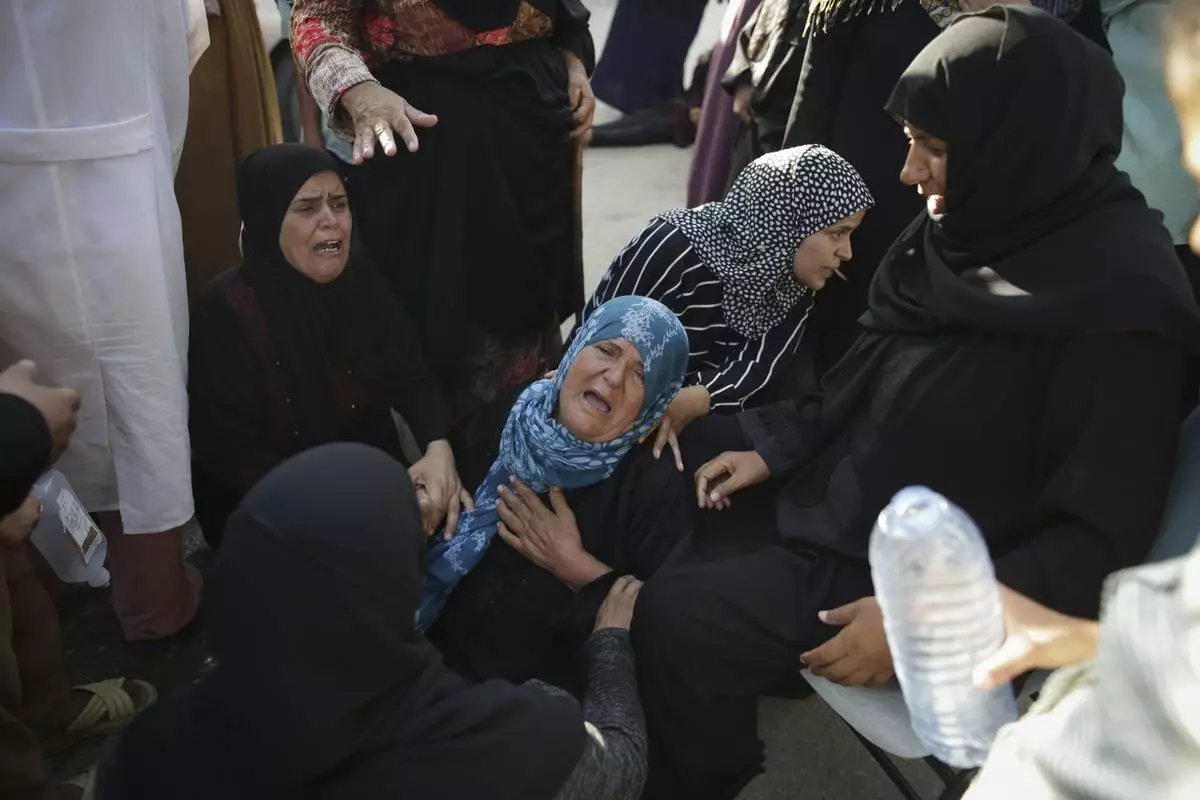
Palestinians mourn their relatives killed in the Israeli bombardment of the Gaza Strip at a hospital morgue in Khan Younis, southern Gaza Strip, Monday, June 24, 2024. (AP Photo/Jehad Alshrafi)
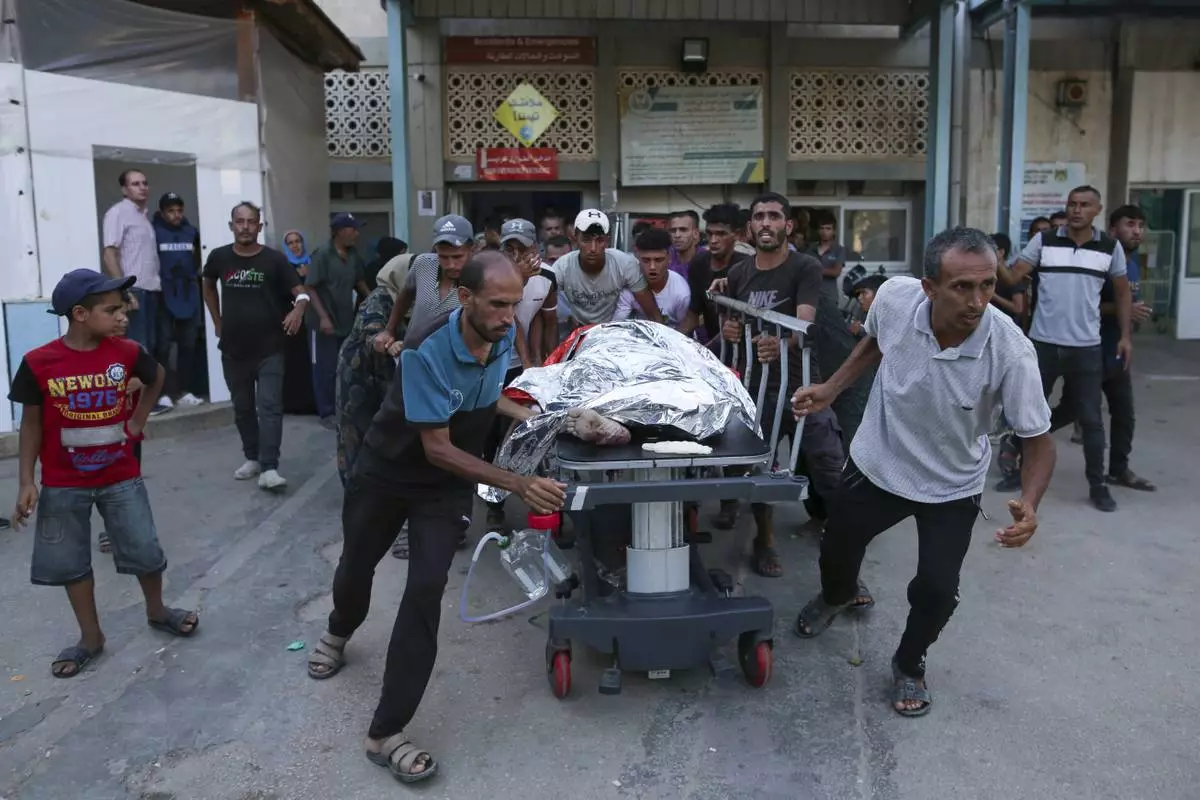
Palestinians carry the body of a man killed in the Israeli bombardment of the Gaza Strip to a hospital morgue in Khan Younis, southern Gaza Strip, Monday, June 24, 2024. (AP Photo/Jehad Alshrafi)
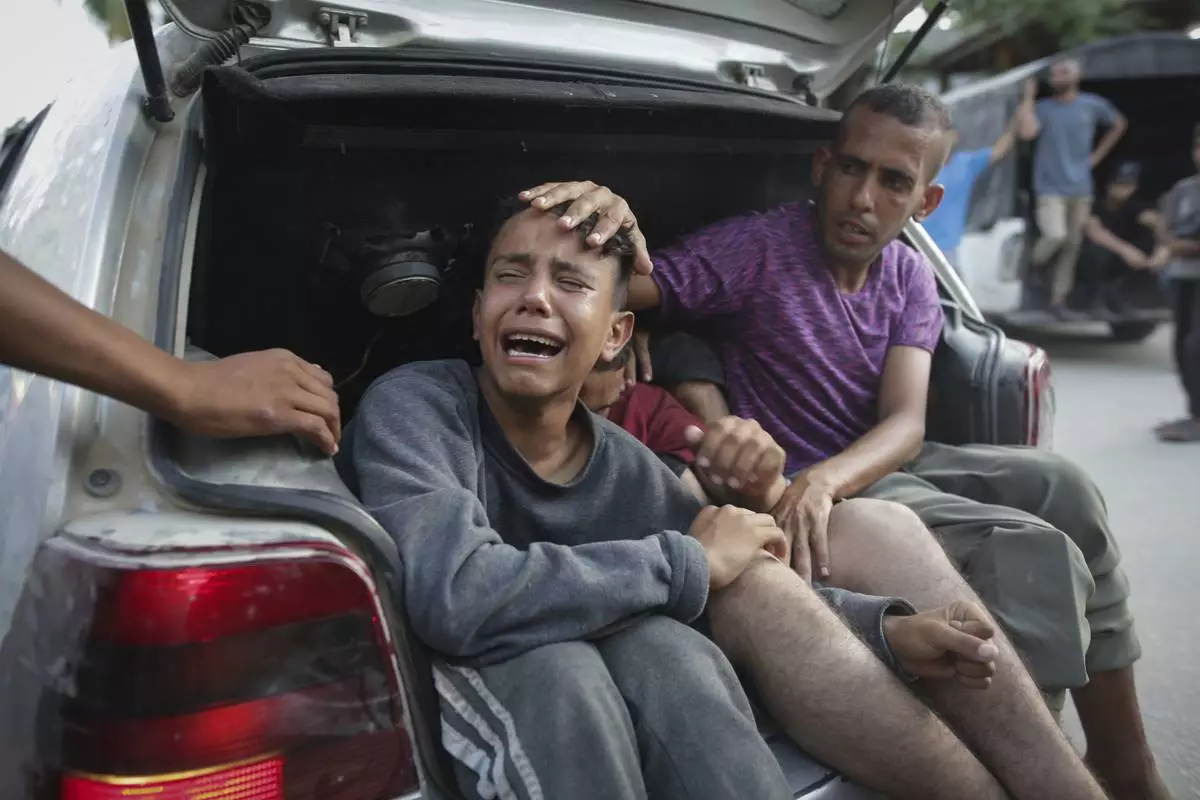
Palestinians mourn their relatives killed in the Israeli bombardment of the Gaza Strip at a hospital morgue in Khan Younis, southern Gaza Strip, Monday, June 24, 2024. (AP Photo/Jehad Alshrafi)
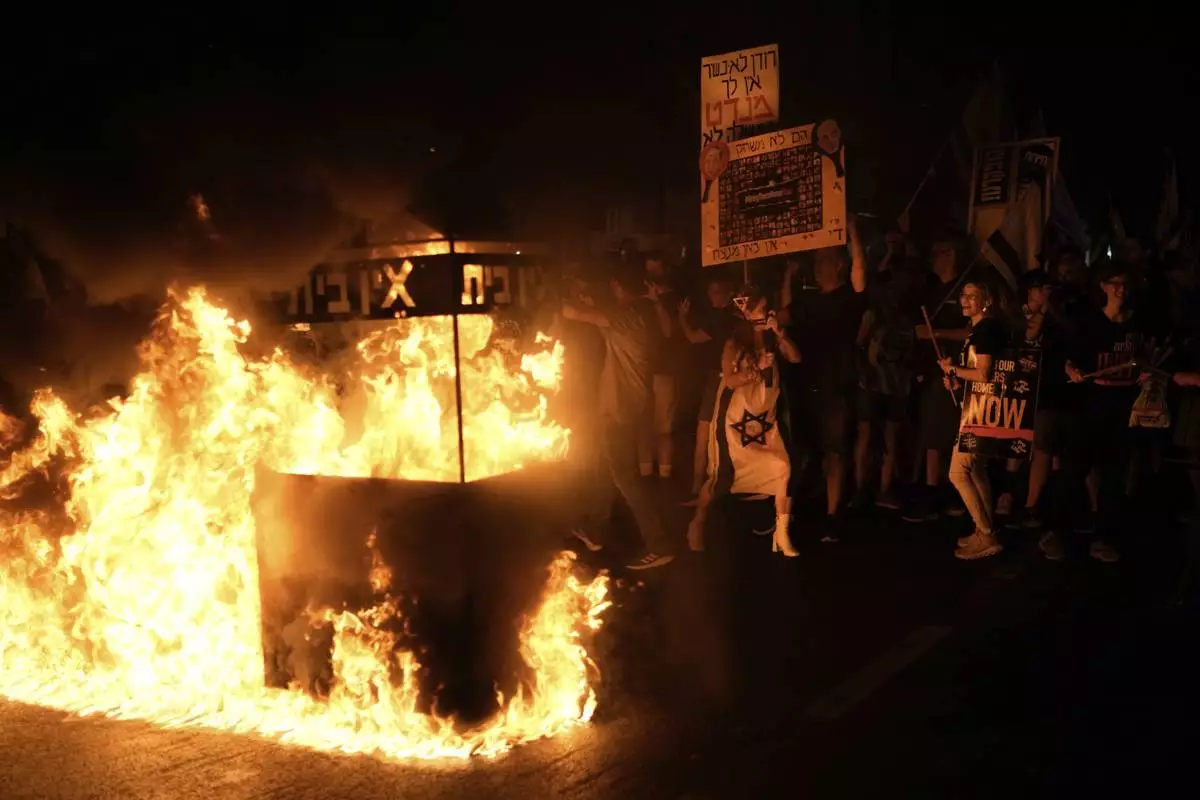
People protest against Israeli Prime Minister Benjamin Netanyahu's government and call for the release of hostages held in the Gaza Strip by the Hamas militant group, in Tel Aviv, Israel, Saturday, June 22, 2024. (AP Photo/Leo Correa)
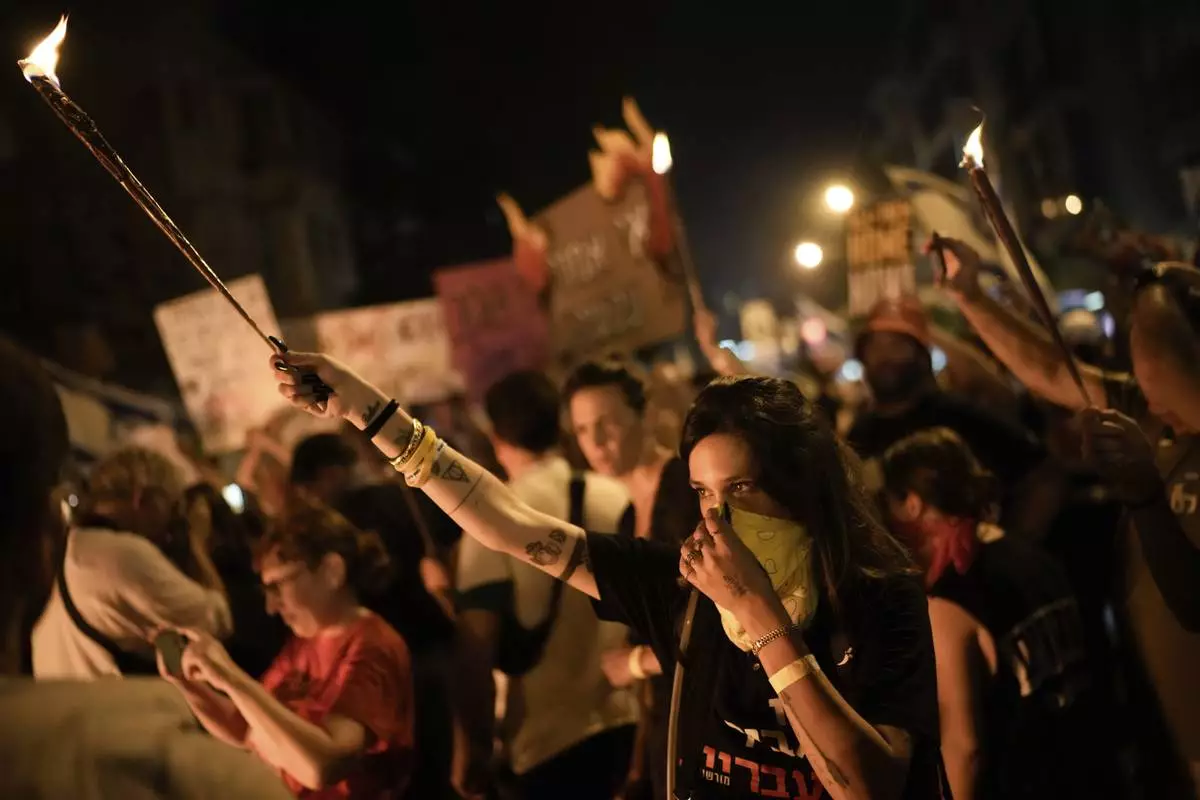
People protest against Israeli Prime Minister Benjamin Netanyahu's government and call for the release of hostages held in the Gaza Strip by the Hamas militant group, in Tel Aviv, Israel, Saturday, June 22, 2024. (AP Photo/Leo Correa)

People protest against Israeli Prime Minister Benjamin Netanyahu's government and call for the release of hostages held in the Gaza Strip by the Hamas militant group, in Tel Aviv, Israel, Saturday, June 22, 2024. (AP Photo/Leo Correa)
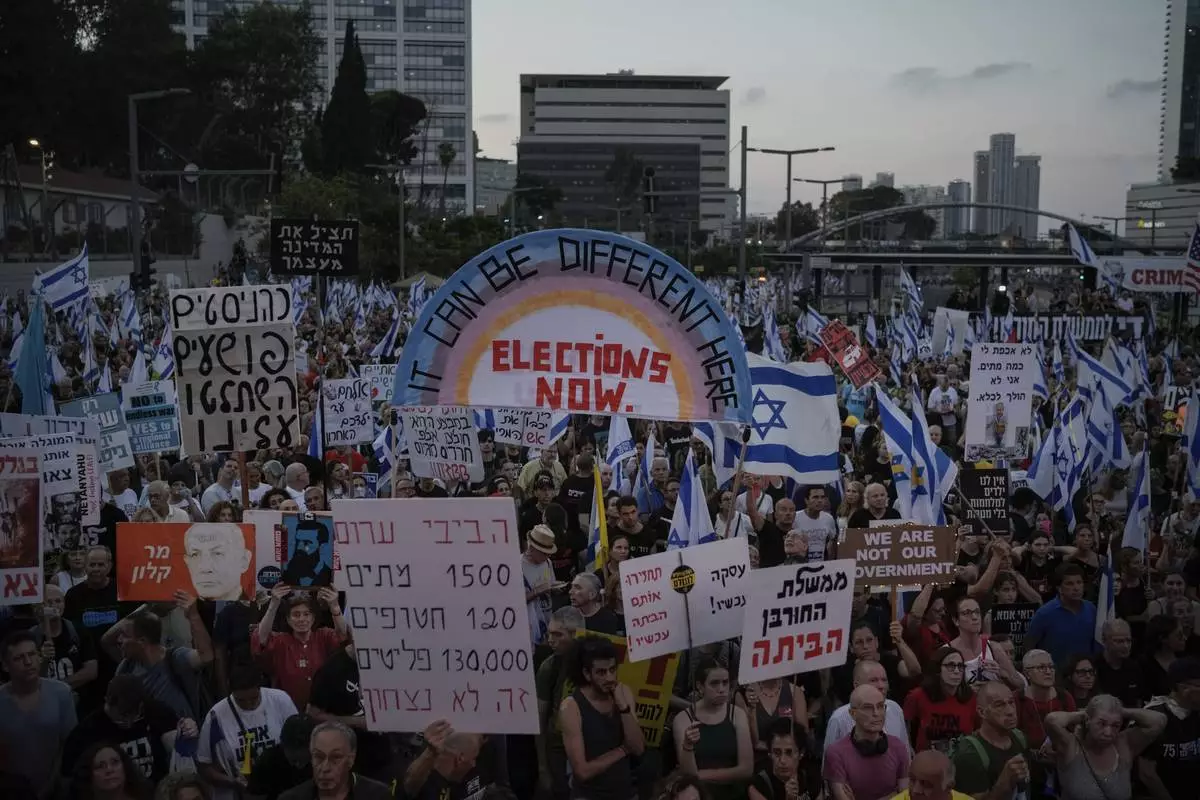
People attend a protest against Israeli Prime Minister Benjamin Netanyahu's government and demanding elections, in Tel Aviv, Israel, Saturday, June 22, 2024. (AP Photo/Leo Correa)
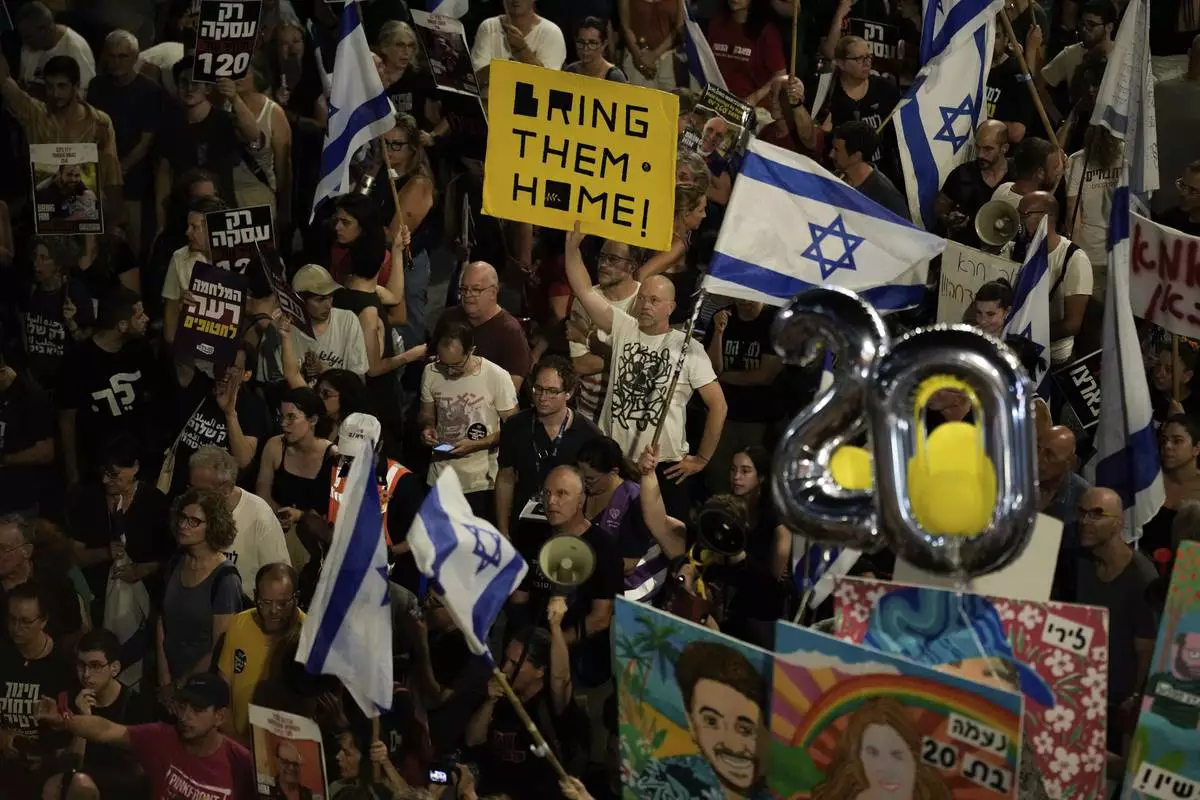
People protest against Israeli Prime Minister Benjamin Netanyahu's government and call for the release of hostages held in the Gaza Strip by the Hamas militant group, in Tel Aviv, Israel, Saturday, June 22, 2024. (AP Photo/Leo Correa)
A jury found a suburban Seattle police officer guilty of murder Thursday in the 2019 shooting death of a homeless man outside a convenience store, marking the first conviction under a Washington state law easing prosecution of law enforcement officers for on-duty killings.
After deliberating for three days, the jury found Auburn Police Officer Jeffrey Nelson guilty of second-degree murder and first-degree assault for shooting Jesse Sarey twice while trying to arrest him for disorderly conduct. Deliberations had been halted for several hours Wednesday after the jury sent the judge an incomplete verdict form Tuesday saying they were unable to reach an agreement on one of the charges.
The judge revealed Thursday that the verdict the jury was struggling with earlier in the week was the murder charge. They had already reached agreement on the assault charge.
Nelson was taken into custody after the hearing. He's been on paid administrative leave since the shooting in 2019. The judge set sentencing for July 16. Nelson faces up to life in prison on the murder charge and up to 25 years for first-degree assault. His lawyer said she plans to file a motion for a new trial.
Elaine Simons, who had been Sarey's foster mother, said the guilty verdicts provided resolution and peace for his family.
“This has been a long five years for a semblance of justice,” she told The Associated Press. “It has set a precedent for police officers to do what is right. The citizens of Auburn can have a sense of safety.”
Gary Damon, executive director of the Washington Coalition for Police Accountability, a group led by families who have lost loved ones to police violence, said the verdict was a significant step toward greater accountability for officers. Leslie Cushman, who was involved in the campaign to change the state's law to make it easier to charge officers, said the trial was profoundly important.
“Had this gone the other way, we would have had a serious disillusionment,” Cushman said. “This is good news and affirming for all who stand for justice.”
The King County Prosecuting Attorney's office thanked the jury for their efforts on the case, which has gone on for more than three weeks.
“We appreciate the hard work of all parties to get to these important verdicts,” spokesman Casey McNerthney said in an email. “All along we felt this was a case that needed to be tried before a jury. Our thoughts continue to be with Mr. Sarey’s loved ones.”
Prosecutors said Nelson punched Sarey several times before shooting him in the abdomen. About three seconds later, Nelson shot Sarey in the forehead. Nelson had claimed Sarey tried to grab his gun and a knife, so he shot him in self-defense, but video showed Sarey was on the ground reclining away from Nelson after the first shot.
The case was the second to go to trial since Washington voters in 2018 removed a standard that required prosecutors to prove an officer acted with malice — a standard no other state had. Now they must show the level of force was unreasonable or unnecessary. In December, jurors acquitted three Tacoma police officers in the 2020 death of Manuel Ellis.
Nelson had responded to reports of a man throwing things at cars, kicking walls and banging on windows in a shopping area in Auburn, a city of 70,000 about 28 miles (45 kilometers) south of Seattle. Callers said the man appeared to be high or having mental health issues.
Sarey was the son of survivors of the Khmer Rouge genocide in Cambodia and became homeless after aging out of foster care, his family said.
Nelson confronted Sarey in front of the store and attempted to get him into handcuffs. When Sarey resisted, Nelson tried to take Sarey down with a hip-throw and then punched him seven times. He pinned Sarey against the wall, pulled out his gun and shot him. Sarey fell to the ground.
Nelson’s gun jammed, he cleared it, looked around and then aimed at Sarey’s forehead, firing once more.
A witness, Steven Woodard, testified that after the first shot, “Mr. Sarey was ‘done,’ lying on the ground in a nonthreatening position.”
Nelson claimed Sarey tried to grab his gun, leading to the first shot. He said he believed Sarey had possession of his knife during the struggle and said he shot him in self-defense. Authorities have said the interaction lasted 67 seconds.
“Jesse Sarey died because this defendant chose to disregard his training at every step of the way,” King County Special Prosecutor Patty Eakes told the jury in her closing argument Thursday. The shooting was “unnecessary, unreasonable and unjustified,” she said.
Nelson’s attorney, Kristen Murray, told the jury officers are allowed to defend themselves.
“When Mr. Sarey went for Officer Nelson’s gun, he escalated it to a lethal encounter,” she said.
Auburn settled a civil rights claim by Sarey’s family for $4 million and has paid nearly $2 million more to settle other litigation over Nelson’s actions as a police officer.
Sarey was the third person Nelson has killed in his law enforcement career. Jurors did not hear evidence about Nelson’s prior uses of deadly force.
Prior to fatally shooting Sarey, Nelson killed Isaiah Obet in 2017. Obet was acting erratically, and Nelson ordered his police dog to attack. He then shot Obet in the torso. Obet fell to the ground, and Nelson fired again, fatally shooting Obet in the head. Police said the officer’s life was in danger because Obet was high on drugs and had a knife. The city reached a settlement of $1.25 million with Obet’s family.
In 2011, Nelson fatally shot Brian Scaman, a Vietnam War veteran with mental issues and a history of felonies, after pulling Scaman’s vehicle over for a burned-out headlight. Scaman got out of his car with a knife and refused to drop it; Nelson shot him in the head. An inquest jury cleared Nelson of wrongdoing.
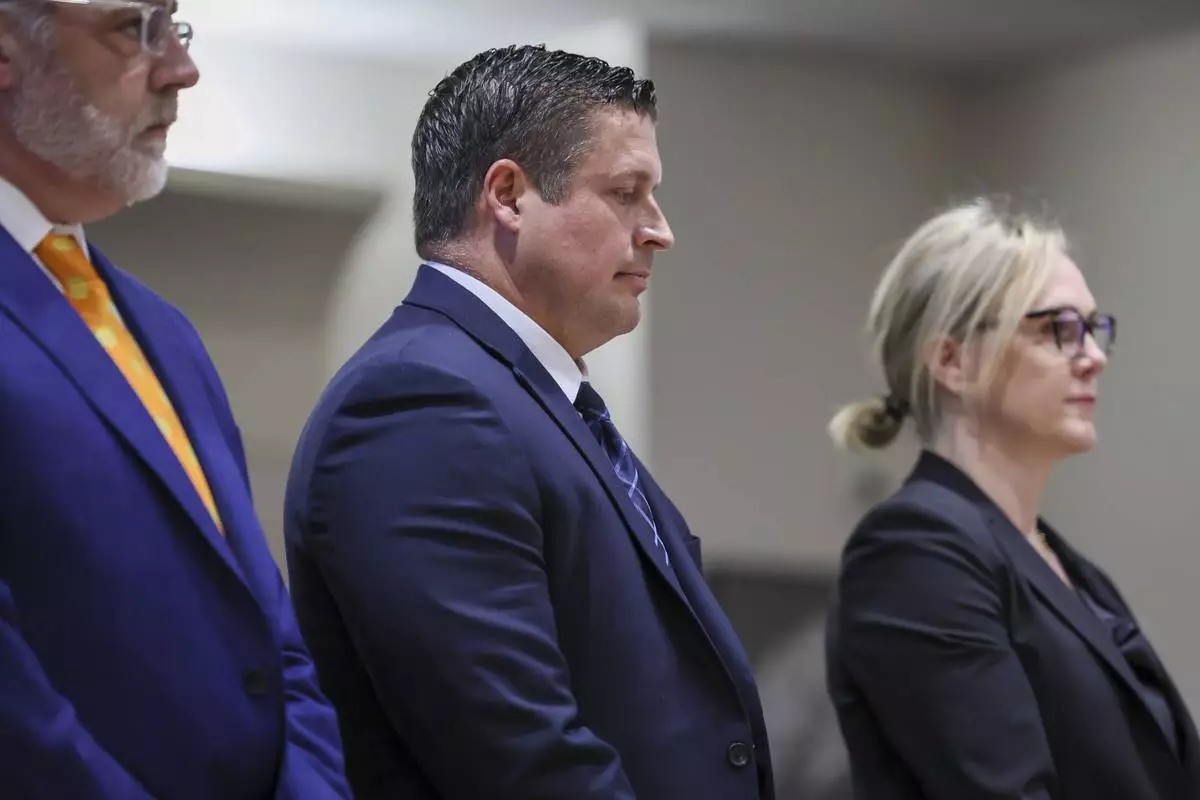
Jeffrey Nelson, flanked by attorneys, stands at the King County Maleng Regional Justice Center in Kent, Wash., on Thursday, June 27, 2024. A jury found the suburban Seattle police officer guilty of murder in the 2019 shooting death of a homeless man outside a convenience store, marking the first conviction under a Washington state law easing prosecution of law enforcement officers for on-duty killings. (Kevin Clark/The Seattle Times via AP)
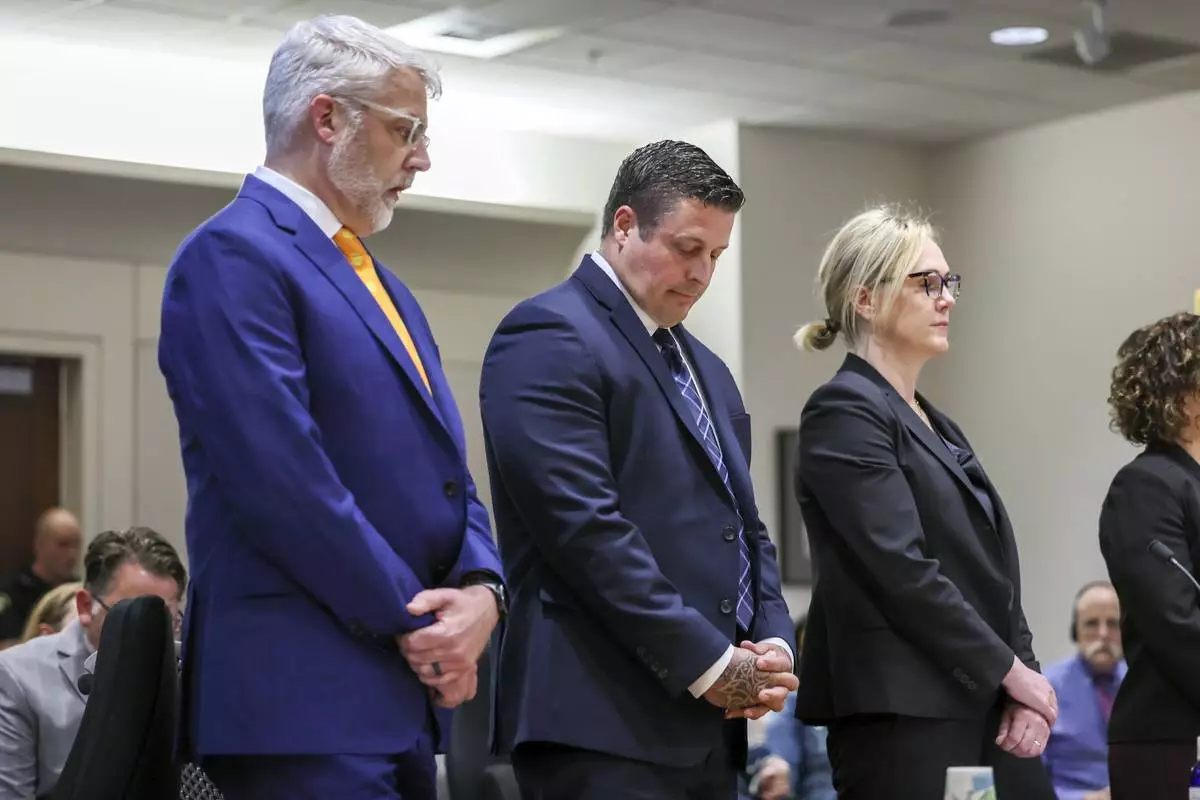
Jeffrey Nelson, flanked by attorneys, stands at the King County Maleng Regional Justice Center in Kent, Wash., on Thursday, June 27, 2024. A jury found the suburban Seattle police officer guilty of murder in the 2019 shooting death of a homeless man outside a convenience store, marking the first conviction under a Washington state law easing prosecution of law enforcement officers for on-duty killings. (Kevin Clark/The Seattle Times via AP)
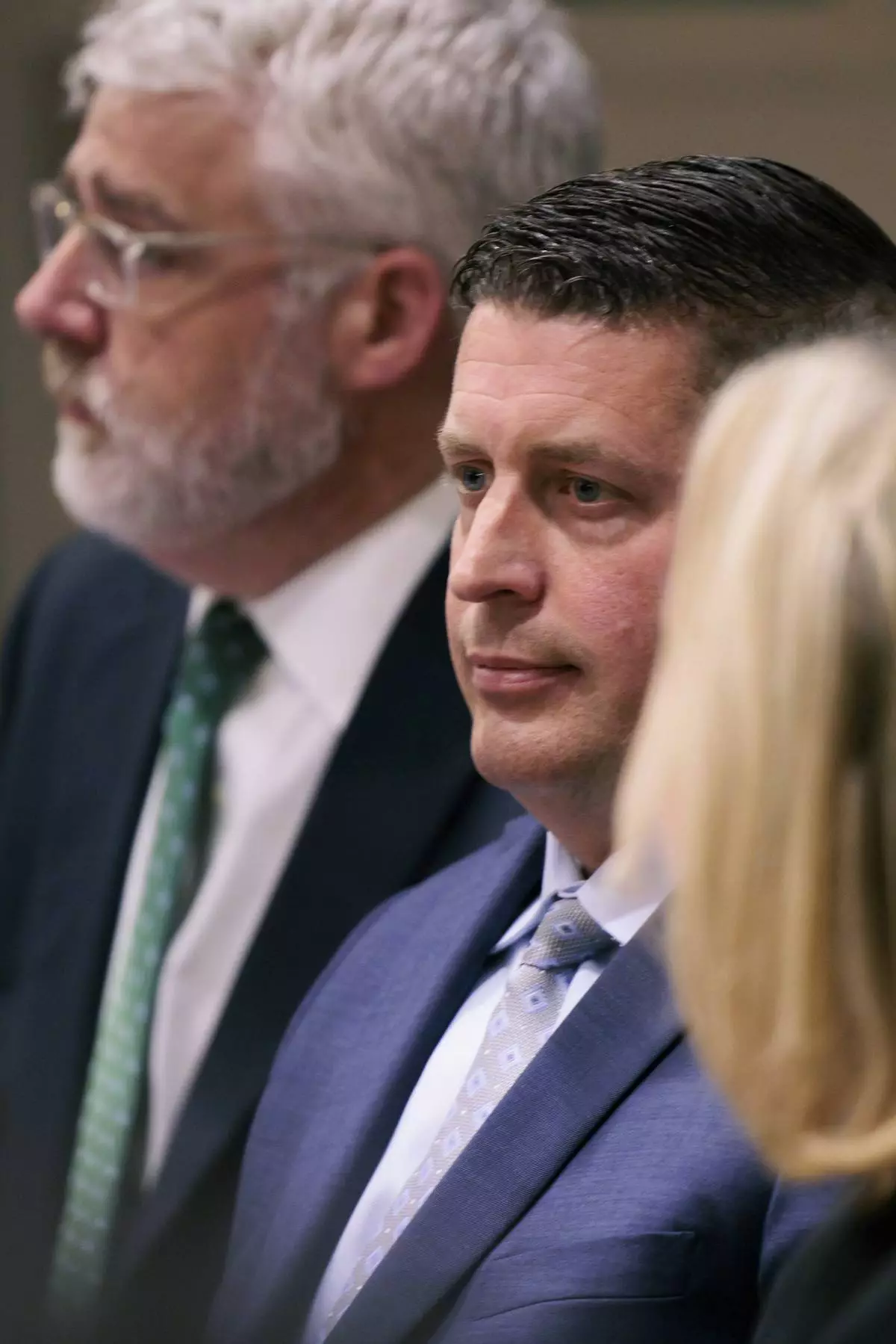
FILE - Auburn Police Officer Jeffrey Nelson, center, and defense attorney Tim Leary, behind, attend closing arguments, Thursday, June 20, 2024, at Maleng Regional Justice Center in Kent, Wash. A jury found the suburban Seattle police officer guilty of murder Thursday, June 27, in the 2019 shooting death of a homeless man outside a convenience store, marking the first conviction under a Washington state law easing prosecution of law enforcement officers for on-duty killings. (Erika Schultz/The Seattle Times via AP, File)
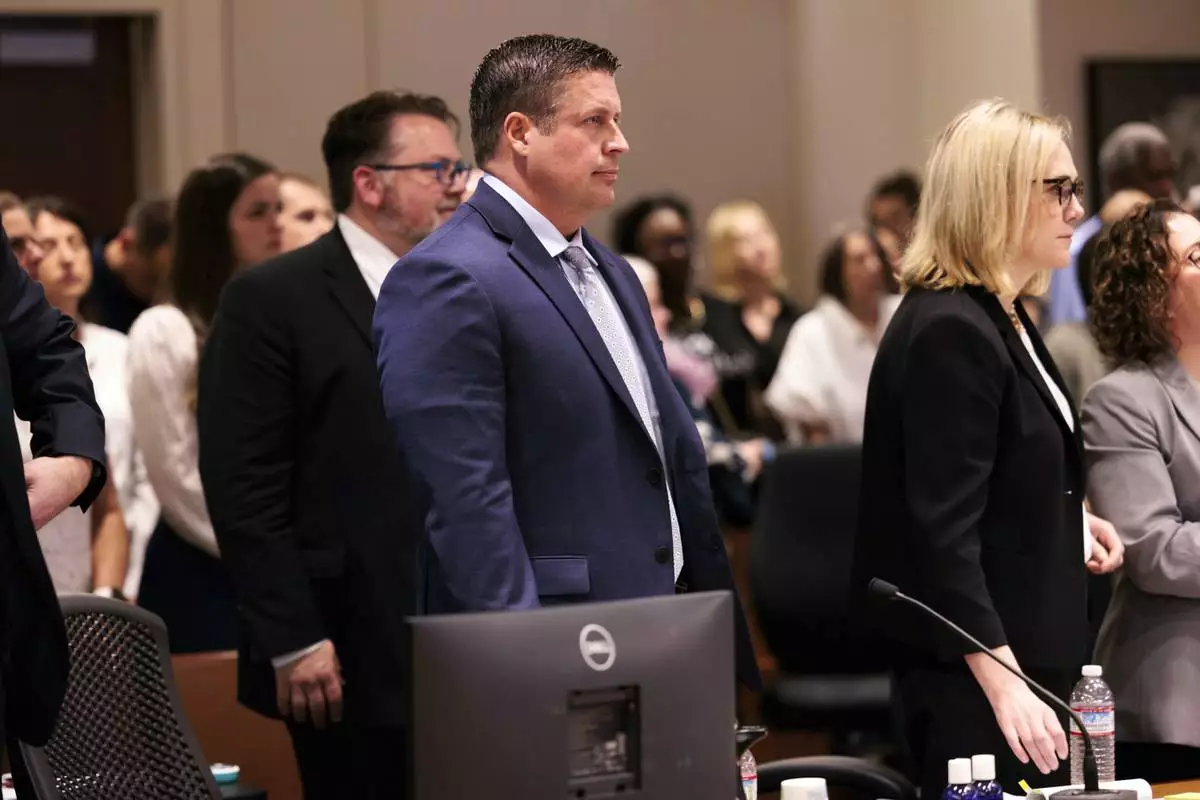
FILE - Auburn Police Officer Jeffrey Nelson, center, attends closing arguments in his trial, Thursday, June 20, 2024, at the Maleng Regional Justice Center in Kent, Wash. A jury found the suburban Seattle police officer guilty of murder Thursday, June 27, in the 2019 shooting death of a homeless man outside a convenience store, marking the first conviction under a Washington state law easing prosecution of law enforcement officers for on-duty killings. (Erika Schultz/The Seattle Times via AP, File)
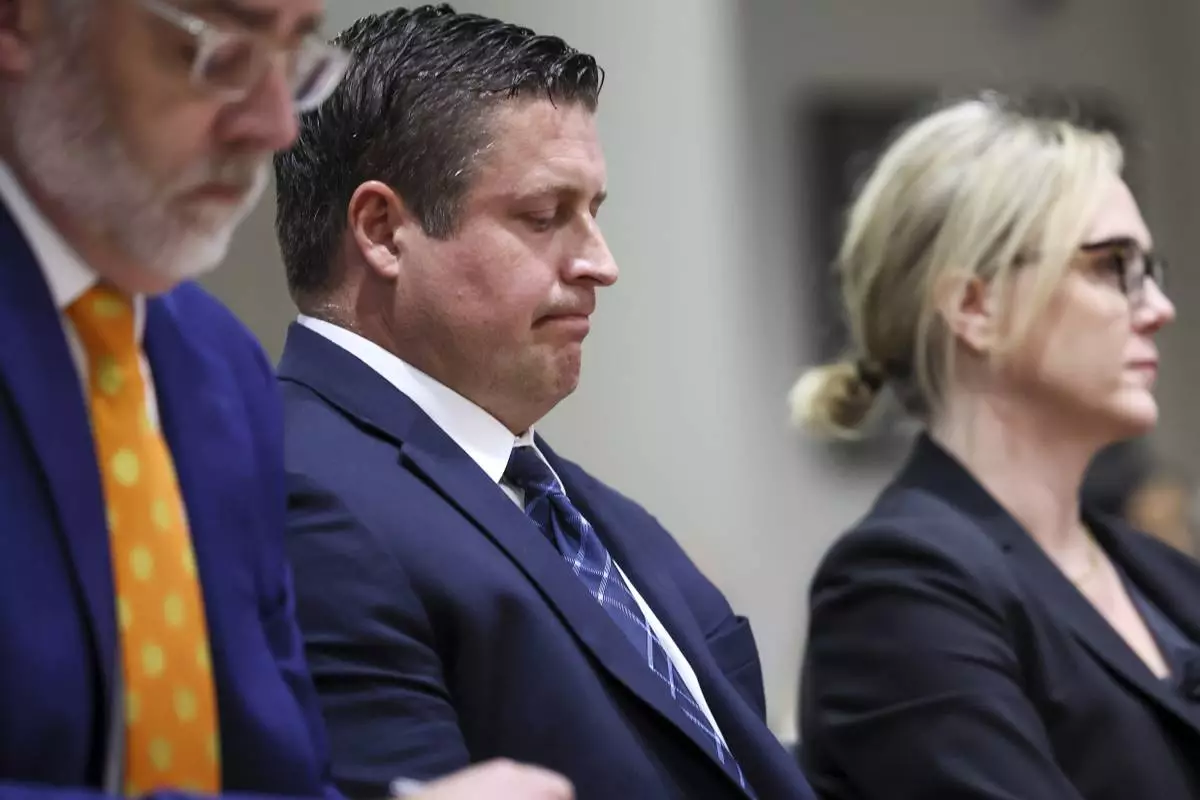
Jeffrey Nelson awaits the jury's verdict at the King County Maleng Regional Justice Center in Kent, Wash., on Thursday, June 27, 2024. (Kevin Clark/The Seattle Times via AP)
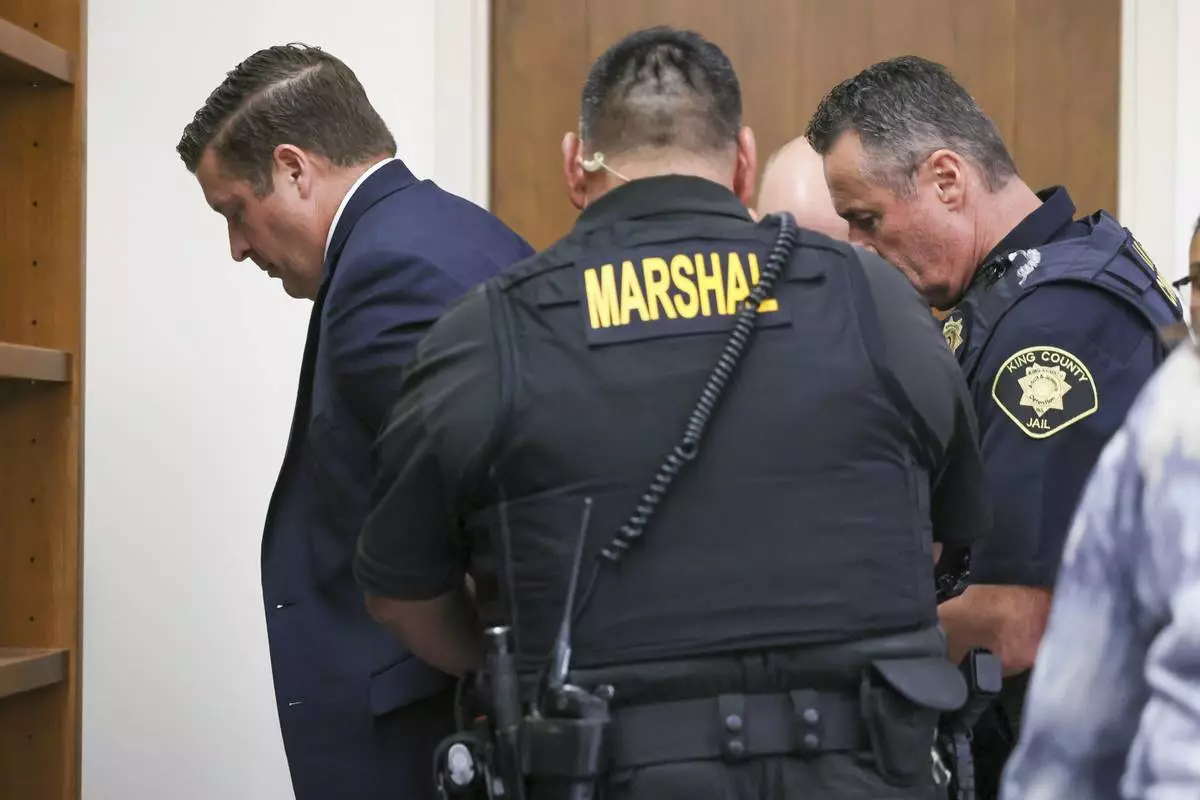
Auburn Police Officer Jeffrey Nelson is taken into custody after two guilty verdicts were headed down by the jury Thursday at the King County Maleng Regional Justice Center in Kent, Wash., on Thursday, June 27, 2024. Nelson was found guilty of second-degree murder and first-degree assault for shooting Jesse Sarey twice while trying to arrest him for disorderly conduct. (Kevin Clark/The Seattle Times via AP)
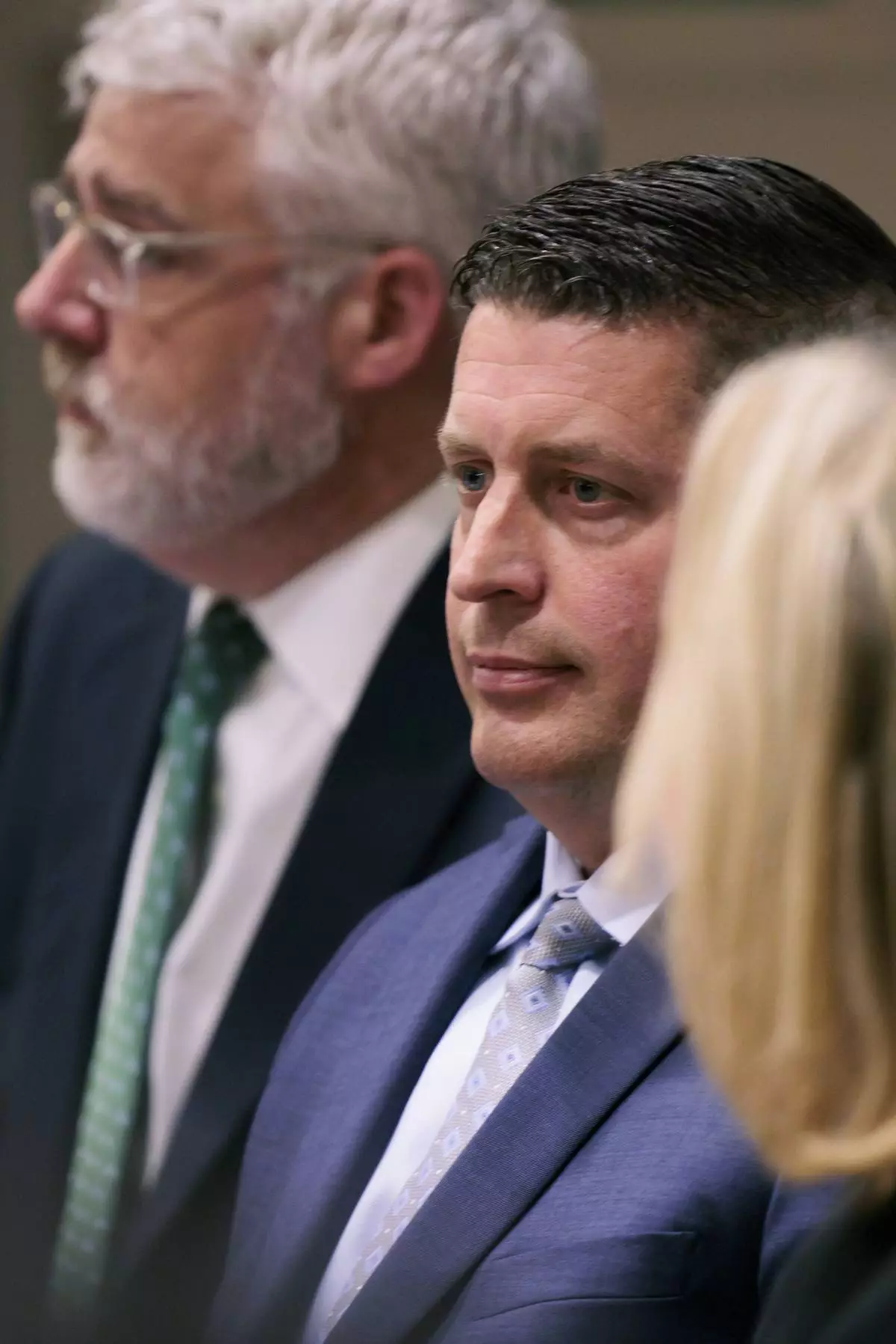
Auburn Police Officer Jeffrey Nelson, center, and defense attorney Tim Leary, behind, attend closing arguments at Maleng Regional Justice Center in Kent, Wash., Thursday, June 20, 2024. Officer Nelson is charged with fatally shooting Jesse Sarey, 26, while attempting to arrest him for disorderly conduct on May 31, 2019. (Erika Schultz/The Seattle Times via AP)
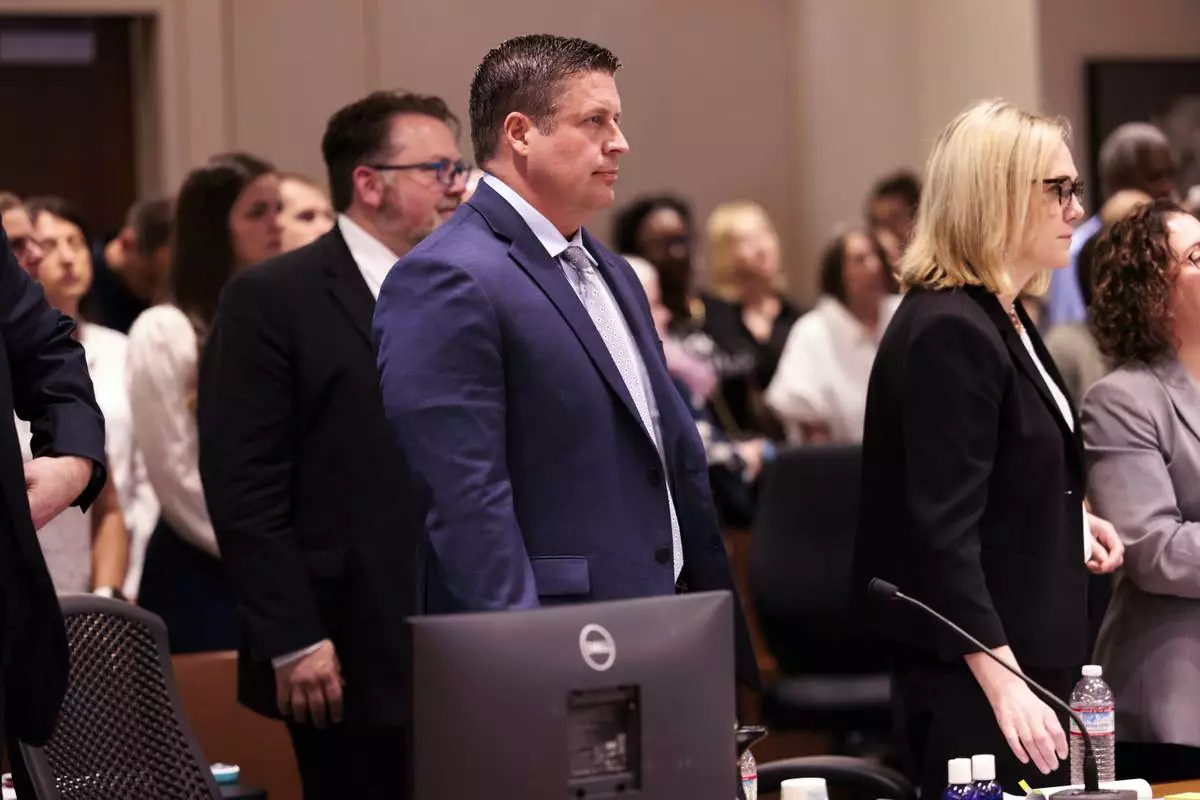
Auburn Police Officer Jeffrey Nelson, center, attends closing arguments in his trial, Thursday, June 20, 2024, at the Maleng Regional Justice Center in Kent, Wash. Officer Nelson is charged with fatally shooting Jesse Sarey, 26, while attempting to arrest him for disorderly conduct on in 2019. (Erika Schultz/The Seattle Times via AP)










